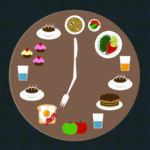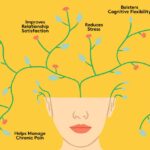After a long and difficult day, many individuals find comfort in a bowl of warm spaghetti, a spoonful of ice cream, or the crunch of a bag of potato chips. It’s a common human reaction to eat more than usual, even if you’re not hungry, because food has meaning beyond its nutritional value. Working with a professional who can show you how to stop stress eating is a good idea when emotional eating during times of stress has become a regular occurrence and is preventing you from reaching your wellness objectives.
Grab a glass of water
Celio suggests starting with a full glass of water if you’re feeling anxious; he acknowledges that this may be the oldest trick in the book. After all, many of us already don’t drink enough water, and we could mistake the symptoms of thirst for those of hunger or uncontrollable tension.
Write it down
If you’re feeling overwhelmed, Celio suggests grabbing a notepad—not your phone or computer—and writing things down the old fashioned way. She suggests making a list in bullet form of everything that is stressing you out and why. She recommends keeping a diary because ‘writing things down may clarify where the stress is coming from and also give you the perspective that while eating a bowl of pretzels does not, in fact, fix the tap, maybe YouTubing how to do it does’.
Sip on tea
“If I have a mug, some boiling water, a cinnamon stick, and a teaspoon of honey, then I have what I need to curb sugar cravings when stressed,” explains Susan Albers, a psychologist at the Cleveland Clinic and the New York Times bestselling author of Eating Mindfully. “Clinical studies have shown that cinnamon aids in maintaining normal insulin levels.” You may also try sprinkling some cinnamon in your morning coffee or switching to chai tea for breakfast instead of the traditional English meal.
Take a 15-minute walk
In agreement, Celio argues that moderate, regular exercise is beneficial to both mental and physical health. Find an activity you enjoy, whether it’s a brisk walk, a ride on a stationary bike, a set of planks, a dance party, or anything else, and do it every day for at least 10 minutes, ideally 30. It provides us something to do that pushes us to get better and stronger, as well as boosts our mood and sleep quality, and benefits our gut microbiome.
Peel a clementine
Mindful relaxation can be as easy as peeling a clementine. According to Albers, “peeling citrus fruit is a mini-meditative moment” since it requires the use of both hands. The pleasant aroma of citrus has also been proved to reduce stress, which could help you resist the office’s free doughnuts. Peel the fruit in a spiral pattern while taking deep breaths of the fragrant air for maximum relaxation. When you’re done peeling, take your time and enjoy the fruit by nibbling on individual segments.
Make avocado toast
When looking for a snack, Harbstreet advises picking something that won’t add to your anxiety levels. It’s not the best time to try your hand at making an elaborate gourmet dish from scratch or one that requires unusual or hard-to-find components. “Just keep it straight forward and basic,” she advises. In addition, it should be something that satisfies you.
Think long-term
Albers claims that the satisfaction from eating comfort food only lasts for three minutes. I find it useful to keep this figure in the forefront of my mind at all times. What can I do to feel better for more than three minutes? I ask myself. It’s not a cookie most of the time.”

In addition, Celio suggests taking stock of your hunger levels at regular intervals. “Is your body hungry, or are we exhausted and looking for a pick-me-up?” Do we just want to experience something new? “A lot of people use food to medicate their emotions,” she explains. She cautions that the short-term boost of energy and happiness from a high-sugar option is outweighed by the longer-term fatigue and depression that can result from the sugar crash that inevitably follows.
Take a mustard bath
The English mustard bath is my favourite, adds Albers. Dry mustard has been used to increase body temperature for thousands of years. A few teaspoons of this, some Epsom salts, and some lavender essential oil in a hot bath and you’ve got immediate relaxation. It’s a nice change of pace from traditional fall/winter comfort dishes on a chilly night.
Get distracted
Also Read: Independence Day saw the Burj Khalifa lit in the colours of the Indian flag.
Jennifer Nasser, Ph.D., R.D., associate professor of nutrition sciences at Drexel University, advises, “Keep your hands and mind busy with some sort of fun activity.” “Knitting, colouring, and drawing are all great ways to divert your attention away from cravings.” Bazilian concurs, noting that there are plenty of alternatives to giving in to a stress-induced hunger, such as messaging a buddy, checking email, or playing a mobile game for a few minutes.
Be strategic with snacks
Nasser recommends keeping some low-calorie finger snacks on available, such as small carrots, apple slices, or celery, if you are the type of person who prefers to chew in response to stress. To help you feel fuller for longer, try adding some protein in the form of nut butters. She recommends combining sweet and savoury flavours, such as honey and cinnamon with cottage cheese, if you’re craving something sweet. To paraphrase: “That way, you’ll get the sweet taste in addition to the fullness signals that protein sends to the brain to get you to stop eating.”





